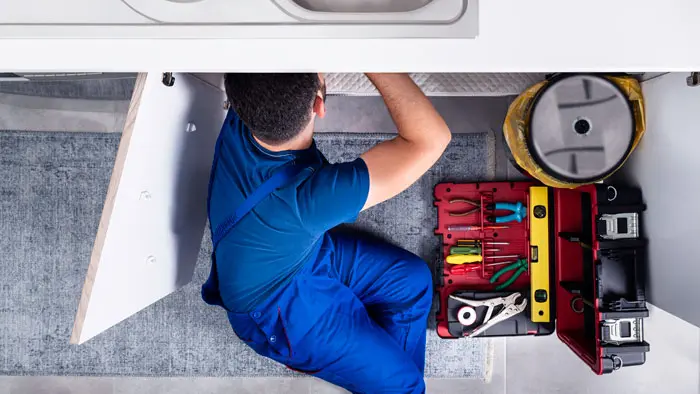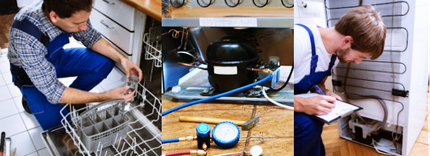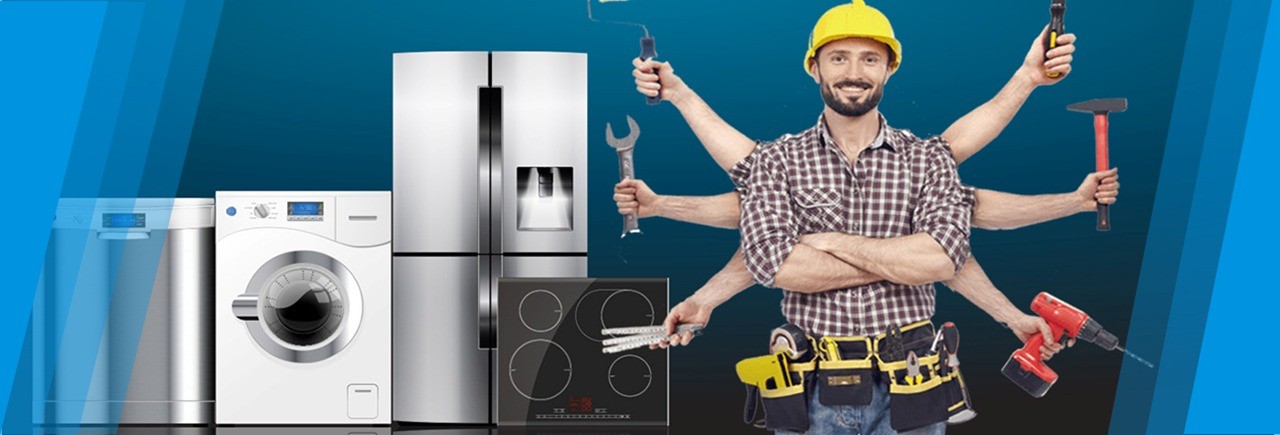Kenmore Dryer Not Heating? – Kenmore Dryer Repair Oro Valley Dependable Refrigeration & Appliance Repair Service
Kenmore Dryer Not Heating? – Kenmore Dryer Repair Oro Valley Dependable Refrigeration & Appliance Repair Service
Blog Article
The Ultimate Guide to Understanding Appliance Fixing in your home
When your fridge stops cooling down or your stove refuses to heat, it can really feel frustrating. Understanding device repair in the house can save you money and time. You'll learn to acknowledge signs, utilize important devices, and adhere to a systematic troubleshooting procedure. However before you begin, there are essential safety preventative measures you require to consider. What are one of the most typical problems, and how can you fix them? Allow's explore the fundamentals.
Usual Appliance Issues and Their Signs and symptoms
When your home appliances begin breaking down, it's vital to acknowledge the indications beforehand. Neglecting them can bring about larger issues and pricey repair work. If your refrigerator isn't cooling down appropriately, you could notice cozy spots or condensation forming. This might indicate a failing compressor or an obstructed vent.Your dish washer might reveal problems with unclean meals or uncommon sounds during cycles. If you listen to grinding or clanking, it's time to investigate.A washing maker that will not rotate or drain pipes can leave you with soaked washing, recommending a stopped up drainpipe or a malfunctioning pump.Lastly, if your oven's temperature appears off or it takes permanently to pre-heat, you could be taking care of a malfunctioning thermostat. By remaining alert to these signs, you can resolve issues prior to they intensify right into major repairs.
Vital Devices for Appliance Repair
When you're taking on home appliance repair services in the house, having the right tools is crucial. Standard hand devices like screwdrivers and pliers will aid you disassemble and fix various devices, while electric testing devices guarantee you're working securely with electrical wiring. Let's look at what you need to obtain begun on your repair work trip.
Fundamental Hand Tools
Having the right tools is vital for effective device repair work at home. Start with a trustworthy screwdriver set, including both flathead and Phillips kinds, as screws prevail in home appliance assembly. Pliers are likewise essential; they help with gripping, turning, and reducing wires or little parts. A pair of needle-nose pliers can reach tight places conveniently. You'll need a good adjustable wrench for tightening or loosening nuts and screws. An utility knife is handy for puncturing product packaging or insulation. Do not neglect a tough workbench or surface area to safely organize your tools and parts. With these standard hand devices, you'll be well-prepared to tackle most home appliance fixings that come your method.
Electric Screening Devices
Along with standard hand tools, electric testing gadgets play an important duty in device repair service. These tools aid you identify electric problems and warranty appliances operate securely. A multimeter is essential; it gauges voltage, current, and resistance, permitting you to pinpoint troubles rapidly. A non-contact voltage tester is another essential, letting you discover real-time cables without making straight contact, enhancing your safety. Clamp meters are fantastic for determining existing circulation in wires without separating them, saving you effort and time. In addition, circuit testers can rapidly inspect if electrical outlets are functioning effectively. By utilizing these tools, you'll streamline your troubleshooting procedure and enhance your repair abilities, making device maintenance a lot less complicated.
Step-by-Step Guide to Diagnosing Home Appliance Issues
When your appliance acts up, it can be frustrating, however identifying the problem does not have to be frustrating. You'll find out to determine usual problems and apply efficient repairing strategies. Allow's walk via the steps to get your appliance back in working order.
Common Appliance Issues

Troubleshooting Strategies Clarified

Fixing Major Kitchen Appliances: A Closer Look
Have you ever before asked yourself exactly how to tackle common concerns with your cooking area home appliances? Repairing major kitchen devices like refrigerators, ovens, and dishwashers can be much easier than you assume. Beginning by recognizing the trouble-- whether it's a fridge not cooling or a stove that won't heat up. Frequently, a simple reset or inspecting the power resource can solve the issue.For refrigerators, tidy the condenser coils and examine the door seals. If your oven's not home heating, inspect the burner and thermostat. Dishwashers may just need a clean filter or a reset to obtain them back in action. Constantly disconnect the appliance prior to diving into repairs to guarantee your safety.Don' t fail to remember to seek advice from the customer guidebook for particular troubleshooting suggestions associated with your model. With a little bit of persistence and the right tools, you can with confidence tackle appliance repair work and save cash at the same time!

Repairing Laundry Appliances: Tips and Techniques
When your laundry devices begin breaking down, it can feel frustrating, yet repairing them doesn't need to be a hassle. Start by inspecting the power supply. Verify the device is plugged in and the outlet is functioning. Next off, check the door or lid button; a faulty button can stop the machine from operating.For washing machines, if it's not rotating, examine for out of balance loads. Redistributing the clothes might solve the concern. If your dryer isn't heating, tidy the lint filter and check the vent for blockages.Listen for unusual sounds; they can indicate an issue. If your device is leaking, inspect the pipes for splits or loosened links. Paper any type of mistake codes displayed on digital displays, as they can guide you in identifying the issue. Ultimately, speak with the customer manual for particular repairing tips connected to your design.
Safety And Security Preventative Measures to Take Throughout Fixes
Before you start any appliance repairs, it's important more info to prioritize safety to stop mishaps or injuries. Initially, unplug the appliance or shut off the breaker to ensure no power reaches it while you work. Usage protected devices to decrease the threat of electric shock. Wear safety and security goggles and handwear covers to safeguard on your own from sharp sides or debris (Dependable Refrigeration & Appliance Repair Service Washer repair near me).Make certain your workspace is tidy and well-lit, so you can see what you're doing. Maintain youngsters and family pets far from the area to avoid interruptions and prospective dangers. If you're managing gas home appliances, be added careful; check for leakages before proceeding.Take your time, and do not rush with fixings. If you feel unsure regarding any type of step, it's far better to pause and study than to presume. Adhering to these precautions will certainly help develop a more secure setting for your DIY device repair project
When to Call a Professional for Help
How do you recognize if it's time to employ a professional for appliance repair services? If you've tried standard troubleshooting without success, it's a clear indicator. As an example, if your appliance still won't start or reveals unusual noises after resetting it, don't think twice to seek expert help.When you discover leaks, smoke, or melting scents, focus on safety and call a pro right away. These concerns can result in even more significant damage or present dangers to your home.Also, if your home appliance is under warranty, getting in touch with a professional is typically the very best path. They can guarantee that repair work will not invalidate your service warranty, saving you cash in the long run.Finally, if you're uncertain or unpleasant with intricate repairs, it's wise to leave it to the professionals. Remember, tackling complex issues without the ideal proficiency can bring about pricey blunders. Count on a professional when in doubt!
Often Asked Concerns
Just How Can I Avoid Home Appliance Troubles in the Future?
To avoid device troubles in the future, you should carry out routine maintenance, look for deterioration, clean filters, and stay clear of overloading. Staying aggressive will certainly aid expand their life expectancy and keep them running smoothly.
What Are one of the most Typical Do It Yourself Appliance Repair Work Mistakes?
You could overlook safety preventative measures, skip repairing steps, or use inaccurate devices when attempting do it yourself home appliance repairs. Hurrying the process or disregarding producer guidelines can cause even more considerable concerns and costly blunders. Remain client and notified!
Just how Do I Know if a Part Requirements Substitute?
You can inform if a component needs replacement by looking for unusual sounds, leakages, or inconsistent performance. If the device battles to run properly or reveals noticeable damages, it's likely time for a substitute.
Can I Use Generic Components for Appliance Repair Works?
Yes, you can use common components for appliance repair work, yet establish they work - Dependable Refrigeration & Appliance Repair Service Washing Machine Repair. Generic components might save you cash, but they could affect efficiency or longevity, so weigh your options meticulously prior to choosing
What Service Warranties Cover Home Appliance Fixes?
A lot of appliance warranties cover repair work for manufacturing problems, however they frequently exclude damages from misuse. Check your warranty terms meticulously, as some might require using licensed technicians and original components for protection to continue to be valid.
Report this page